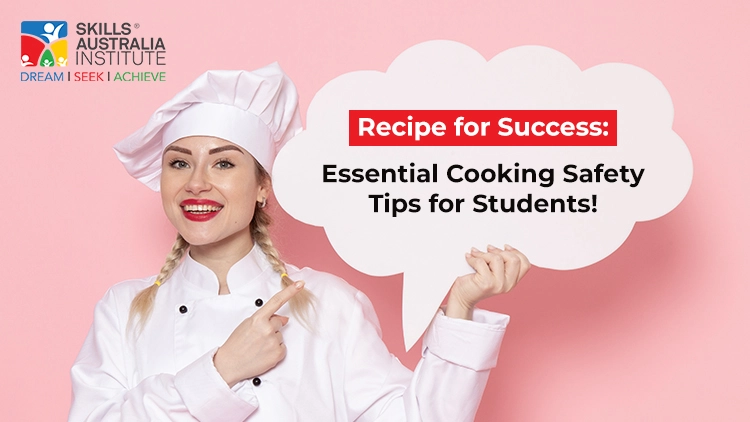- About
- Courses
- International Students
- Domestic Students
- Student Services
- Agents
- Contact

Safety is the first and foremost priority for doing anything. Safety policies are made for the people to be aware of certain hazards within the premises. When it comes to safety, kitchen safety is no exception.
Practicing safety and precautions while cooking does not require you to become the best chef, but it is something that everyone must be aware of. Unfortunately, cooking safety for students is always undermined and taken for granted. A crucial measure must be taught to students in all chef cookery courses and the tips for safety cover food preparation, cleaning up, and proper food storage.
Various accidents and cases of food poisoning can be avoided if one takes the time to understand all the possible hazards in cooking. In this article we will discuss some safety tips for students to keep in mind while learning different cooking courses in Adelaide. Let’s first know more about food poisoning and its hazards.
Foodborne illness commonly known as food poisoning is a result of eating or drinking contaminated or spoiled food or drink. It leads to a range of illnesses including nausea, vomiting, and diarrhea. The effects of food poisoning lie on the ends of the spectrum, that is, it can either make a person feel uncomfortable and unpleasant or it can also be fatal and cause death.
There are several kinds of food poisoning, although some of the more typical ones include:
Food poisoning can be prevented by following basic rules of hygiene. Small things like placing frozen raw meat under running water to defrost or washing the dishes immediately and not letting them marinate in the sink for hours can be taken into practice to make your kitchen perfect and get the best nutrition in your food.
Here are some more tips to enhance your kitchen safety and prepare your food with confidence:
With the best quality of lifestyle and first-class education, Australia is a wide attraction for international students. With the rising hospitality industry, commercial cooking has taken great heights in popularity.
If you are interested in choosing cooking as a career then the best training colleges in Adelaide will make your dream come true. Start from the basic courses to go as high as Certificate 4 in commercial cookery. Study in Adelaide to experience quality student life with extra perks of beauty and mesmerizing views of Australia.
The magic in your cooking comes not only with fresh ingredients and advanced techniques, but safety and health measures play a major role. Understanding the dos and don’ts for cooking when it comes to kitchen safety makes your food more nutritional and healthier for you and your family. If you want to succeed in your career as a commercial chef then these quality measures and safety tips will come handy to maintain a healthy kitchen.